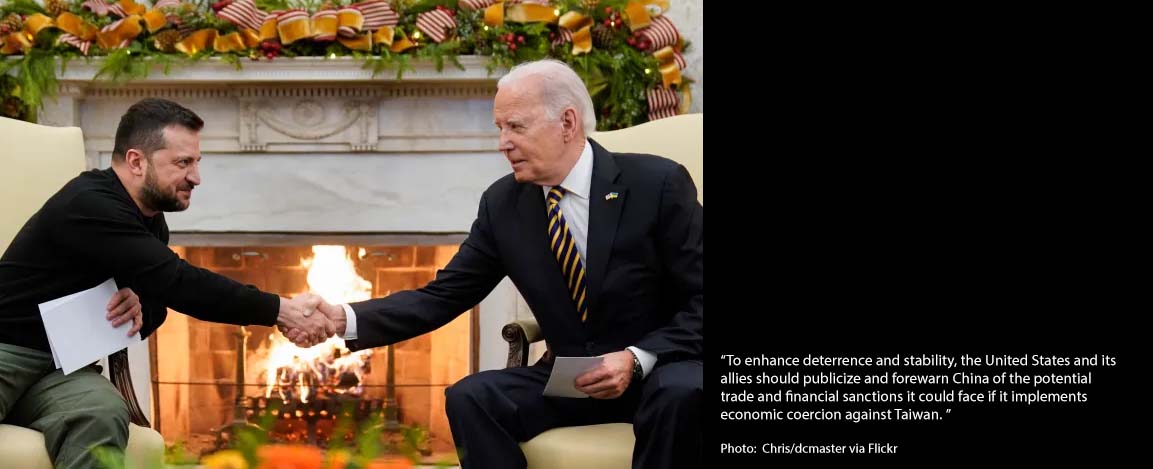Associate professor of political science Caitlin Talmadge stresses the importance of realistic discussions about the Ukraine conflict and advises against pursuing the vague goal of a "strategic defeat" for Russia, as Putin may remain committed to the war. This article was originally published here by The Hill.
The Biden administration has done a generally solid job on Ukraine policy — first warning the world about Russia’s intentions, then helping Ukraine survive the invasion, and subsequently marshalling unprecedented NATO assistance. Along the way, America has avoided provoking Russia escalating to attacks on NATO territory or nuclear weapons use. Today, Ukraine controls more than 80 percent of its pre-2014 territory and is holding its own against Russia in the south and east.
But the war is far from over. Russia aspires to expand its territorial holdings and wants to keep Ukraine permanently destabilized, unable to integrate with the West. Ukraine wants to win back all of its territory, including Crimea, and to pursue its own future economic and security relationships outside Russia’s strategic orbit.
The two sides are so far apart in their goals that negotiations currently seem pointless and, for President Zelensky, politically impossible. Meanwhile, Putin likely believes he can simply wait out Western support and throw more bodies at the front until he exhausts an abandoned Ukraine.
In this context, what should America’s war aims be? President Biden says the United States will help Ukraine “for as long as it takes.” Some Republicans want to cut off all US funding, but most Democrats as well as Republicans seem to have a more practical question: what battlefield goals are truly within reach, and what strategic outcome would be adequate to protect American interests?
Most Americans believe Ukraine has the moral high ground — but that is different from believing Ukraine will get everything it wants at the end of this fight.
We would counsel the Biden administration to rethink two aspects of its approach, even as it remains rightly and resolutely committed to Ukraine’s survival and ultimate reconstruction as a nation.
First, the slogan “as long as it takes” doesn’t work. The war has effectively been stalemated for all of 2023. Reinforcing failure to the tune of more than $50 billion a year in taxpayer money will, at some point, no longer make sense. The Biden administration should argue that Ukraine now deserves a serious chance to try again to win back territory over the 2024-2025 time frame — because the operations Ukraine is attempting are incredibly challenging, because building modern militaries takes time, because it would be awful to see Putin achieve his territorial goals, and because millions of Ukrainians still live under brutal Russian rule.
But once we have a newly elected president — Biden or Trump or someone else — that leader should undertake a strategic review of the Ukraine war over the course of 2025. Should the war still be stalemated then, it would make sense for the US to rethink its maximalist approach to helping Ukraine — and there is no reason not to say so now. This would not embolden Putin, who already assumes as much. Nor would it imply that we might abandon Ukraine in 2025. It would mean only that we might have to scale back our goals for what can be achieved on the battlefield — and to scale back our support for Ukraine at that point accordingly.
Second, the US should avoid setting its sights on the vague goal of a “strategic defeat” for Russia. We do not say this out of any sympathy for Vladimir Putin. And, to be sure, at one level Russia has already suffered a strategic defeat. Putin’s invasion has led to a larger and stronger NATO, severe economic punishment, the exodus of more than a million Russian citizens, at least 300,000 casualties and no obvious path out of what is becoming a forever war.
But Putin will likely remain committed to this war now that he is in it. He has a high tolerance for other people’s pain, which he surely sees as an acceptable price for reclaiming choice land that used to be part of Russia’s empire. And with Russia’s larger population, he may be able to continue paying that price indefinitely. Furthermore, whether or not Russia gains more territory, Putin is achieving his goal of destabilizing and impoverishing Ukraine simply by keeping the war at a stalemate and preventing deeper integration with the West.
As such, the goal should not be “strategic defeat.” The goals, rather, should be stability in Europe and the sustainability of a strong Ukraine, both of which are best served by ending the war sooner rather than later. Achieving these goals will require lots of help for Ukraine even if, ultimately, we must encourage Kyiv to give up on reclaiming all its land. This will also require strong Ukrainian economic and security linkages to the West.
With this kind of more realistic talk about how the United States views the war in Ukraine, the Biden administration may improve its chances of convincing a wary Congress to provide another big assistance package for Kyiv. Now is the moment to help Ukraine prepare the proper offensive that it has not yet had the time, resources or strategic dexterity to prosecute. But that window will not, and should not, last forever — and defeating Putin comprehensively at all costs should not be our central goal.




